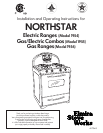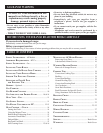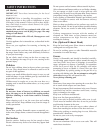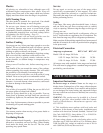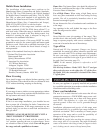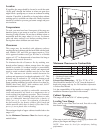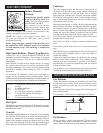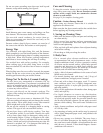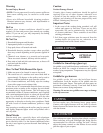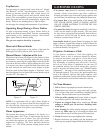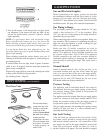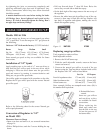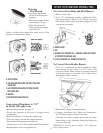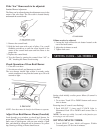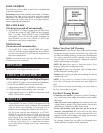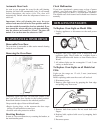
Plastics
All plastics are vulnerable to heat, although some will
withstand higher temperatures than others. Keep all
plastics away from parts of the range which may become
slightly more than warm when the range is in operation.
Self-Cleaning Oven
The door gasket is essential for a good seal. Care should
be taken not to rub, damage or move the gasket.
Do not use oven cleaners on self-cleaning ovens prior
to clean ing. Damage may occur to oven finish at high
temperatures. Remove aluminum or plastic utensils, food
or combustible materials from oven and cooktop before
self-cleaning. (See Self-Cleaning – Page 15)
NOTE: Oven cleaner will not harm porcelain oven but
should not be used in conjuction with selfcleaning.
Surface Cooking
Use proper pan size. Select pans large enough to cover the
element. The use of undersized pans will expose a portion
of the element which may result in burns, ignition of
clothing or spillovers directly on element.
Never leave surface units unattended at high heat setting.
Boil over or boil dry conditions could result in a fire.
Do not use glass or glazed ceramic cookware on the
surface burners, as sudden change in temperature may
break them.
Always turn off surface unit, before removing pots or
pans.
Turn handle of the pan toward the center of the cooktop,
without extending over nearby elements. This will reduce
the possibility of accidentally overturning the pan.
Let hot pans cool in a safe place, out of the reach of young
children. Never set hot pots on a combustible surface.
Do not use decorative metal covers on electric surface
elements. A covered element, when turned on, could result
in a burn or damage to the element.
Frying
Use as little oil as possible. Filling the pan too full of oil
can cause spillovers when food is added.
Foods for frying should be as dry as possible. Frost on
frozen foods or moisture on fresh foods can cause hot oil
to bubble up. Spillovers, fire and burns from splatters could
occur.
Use a deep fat thermometer whenever possible to prevent
overheating oil beyond smoking point.
Deep Fryer
Use extreme caution when moving a hot grease kettle or
disposing of hot grease.
Ventilating Hoods
Clean ventilation hood frequently — grease should not be
allowed to accumulate on hood or filter. When flaming
foods under the hood, turn the fan off. The fan, when
operating, may spread flame.
Service
Do not repair or service any part of the range unless
specifically recommended in this manual. All other
servicing should be referred to a qualified technician.
Disconnect the range from wall receptacle, fuse, or breaker
before performing service.
Safety
Your range, like many other household items, is heavy
and can settle into soft floor coverings such as cushion
vinyl or carpeting. When moving the range on this type of
flooring use care.
If your range must stand beside a refrigerator, allow at
least 2” between the two appliances for air circulation. The
heat from the range may affect refrigerator performance.
Make sure that all the packing materials have been removed
and that all controls are in the off position before plugging
in the power cord.
Electrical Connection
Amperage requirements BTU’s NAT BTU’s LP
Model 1954- 40 Amps, 240 Volts — —
1955- 25 Amps, 240 Volts 43,000 38,700
1956- 10 Amps, 110 Volts 58,000 52,200
All ranges come with standard 4 wire range cord attached.
This cord must be plugged into a standard range receptacle
provided by your electrician.
SAFETY INSTRUCTIONS – GAS
Important Instructions
Do not use range as a heater. Never use the range as a
kitchen heater. Prolonged use of the range without adequate
ventilation can be hazardous. Oven controls and top burners
are not designed for home heating and component failures
that may result from such abuse are definitely not covered by
the warranty.
WARNING: This product must be installed by a licensed
plumber or gas fitter, when installed within the Common-
wealth of Massachusetts. Massachusetts approval code
#G1-1202-18.
#1 This installation must conform with local codes and
ordinances. In the absense of local codes, installations must
conform with American National Standard, National Fuel
Gas Code ANSI Z223.1–latest edition (**) or CAN/CGA-
B149–latest edition (***) installation codes.
#2 Input ratings shown on the serial/rating plate are for
elevations up to 2,000 feet (609.6 m). For elevations above
2,000 feet (609.6 m), ratings are reduced at a rate of 4% for
each 1,000 feet (304.8 cm) above sea level.
4



